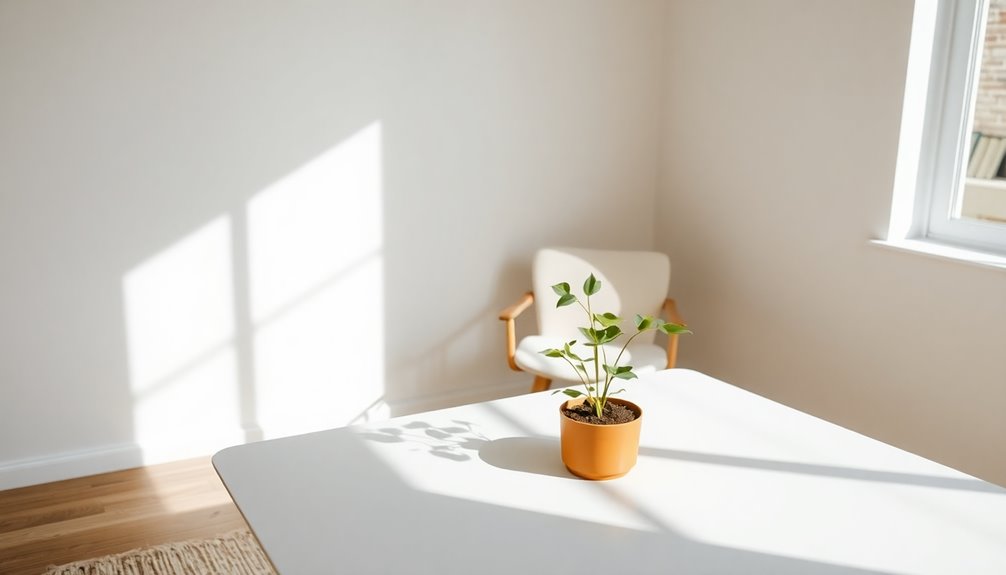Minimalism is all about focusing on what truly matters in life. It encourages you to shed distractions like material possessions and societal expectations. Think of the insights from philosophers like Wittgenstein and Heidegger, who stress clarity and authentic existence. Embrace mindfulness, letting go of attachments to enrich your experiences. As you prioritize quality over quantity, you'll uncover a deeper sense of fulfillment. There's so much more to discover about this philosophy and how it can transform your life.
Key Takeaways
- Minimalism advocates for intentional living, emphasizing the importance of prioritizing essential experiences over material possessions for a fulfilling life.
- Philosophers like Heidegger and Sartre highlight authenticity, urging reflection on one's relationship with belongings and promoting personal agency in choices.
- Mindfulness, rooted in Zen Buddhism, encourages living in the present moment, fostering freedom from attachments and enhancing overall life satisfaction.
- The concept of "less is more" resonates with minimalism, guiding individuals toward deeper connections and richer experiences rather than consumerism.
- Embracing minimalism involves an ongoing journey of decluttering, reevaluating values, and creating space for personal growth and reflection.
The Essence of Minimalism: A Philosophical Overview

What does it mean to embrace minimalism in our lives? It's about adopting intentional living, where you focus on what truly matters.
Minimalism encourages you to shed superficial societal constructs, leading to a more fulfilling existence. The principles of Zen Buddhism resonate here, teaching you to live in the present and detach from material possessions.
By prioritizing quality over quantity, you cultivate a mindset that values essential experiences over the clutter of excess. This philosophy fosters mental well-being and clarity, allowing you to engage authentically with life. Additionally, incorporating self-care practices into your minimalist lifestyle can enhance your overall emotional health.
Ultimately, embracing minimalism means recognizing that less truly is more, guiding you toward a richer, more meaningful life.
Insights From Ludwig Wittgenstein: the Importance of Clarity

Ludwig Wittgenstein believed that clarity in language is essential for meaningful communication.
By simplifying your expression, you can avoid misunderstandings and connect more effectively with others.
Embracing his principles can enhance your self-awareness and align with the minimalist pursuit of focusing on what truly matters. Additionally, cultivating mental clarity through mindfulness practices can further support your journey towards minimalism.
Language and Simplicity
Clarity in language is essential for effective communication, as it allows you to express thoughts without the risk of confusion.
Ludwig Wittgenstein emphasized that simplicity in language fosters understanding, arguing that unnecessary complexity leads to misinterpretation. By advocating for clear articulation, he highlighted the importance of avoiding vague expressions. His famous quote, "Whereof one can't speak, thereof one must be silent," underscores the need for clarity in conveying ideas.
Simplifying language not only enhances communication but also encourages self-awareness and introspection, enabling you to grasp your thoughts more profoundly. When you embrace linguistic simplicity, you align with minimalist principles, creating deeper connections and insights. Additionally, topical authority in communication can significantly enhance the impact of your message by ensuring it resonates with your audience.
Ultimately, clarity in language paves the way for meaningful understanding.
Meaningful Communication Principles
Embracing simplicity in language naturally leads to a focus on meaningful communication. Ludwig Wittgenstein emphasized that clarity is essential; when you express thoughts clearly, you foster authentic connections.
His assertion, "Whereof one can't speak, thereof one must be silent," urges you to articulate only what you can express simply. By adopting this mindset, you align your communication with an intentional life, stripping away unnecessary complexity that clouds understanding.
Wittgenstein's work shows how precise expression shapes your perception of reality. By prioritizing clarity, you can engage in more meaningful communication that resonates deeply with others.
Ultimately, simplicity isn't just a minimalist principle; it's a pathway to genuine interactions and enriched experiences.
Martin Heidegger's Perspective: Authentic Existence and Being

While traversing the complexities of modern life, you might find yourself drawn to Martin Heidegger's philosophy, which emphasizes the significance of authentic existence. He believed that to truly live, you must peel away the layers of superficiality imposed by society, allowing you to engage meaningfully with your life.
Embracing simplicity is key; it leads to a deeper understanding of your purpose and fosters genuine connections with your surroundings. Heidegger encourages you to reflect on your relationship with material possessions, advocating for a minimalist approach that prioritizes essential experiences. By adopting sustainable habits, you can enhance your overall well-being while aligning with the essence of minimalism.
Jean-Paul Sartre: The Role of Freedom and Responsibility

Understanding Jean-Paul Sartre's philosophy reveals how freedom and responsibility intertwine in our lives. He posits that we're "condemned to be free," meaning every choice carries weight. Minimalism enhances this by urging you to make intentional decisions about your possessions, fostering ownership of your life. By embracing authenticity, you align your actions with personal values, a core aspect of Sartre's thought. Moreover, navigating relationships, especially during challenging times like divorce, requires effective communication strategies to manage emotional volatility and maintain clarity.
Here's a quick overview:
| Freedom | Responsibility |
|---|---|
| Embracing choice | Accepting consequences |
| Encouraging intentional living | Making deliberate decisions |
| Rejecting societal expectations | Owning your narrative |
| Fostering authenticity | Confronting "bad faith" |
| Liberating from clutter | Empowering personal agency |
Ultimately, minimalism invites you to navigate your freedom and responsibility authentically.
Albert Camus and the Pursuit of Meaning in Simplicity

When you explore Albert Camus's ideas, you confront the absurdity of existence and realize the importance of the present moment. By rejecting materialism, you can focus on what truly enriches your life, finding meaning in simplicity. Embracing this mindset allows you to prioritize authentic experiences over societal expectations. Additionally, adopting a growth mindset can enhance your resilience and ability to navigate life's challenges.
Absurdity of Existence
How do we navigate a world that seems indifferent to our existence? Embracing the absurdity of existence, you'll find a path toward a meaningful life through simplicity.
Albert Camus encourages you to let go of societal expectations and materialism. A minimalist lifestyle involves:
- Prioritizing genuine experiences over possessions
- Cultivating mindfulness and presence in daily activities
- Finding joy in the little things, like a sunset or a good book
- Building authentic connections with others
Additionally, understanding the importance of emergency funds can provide a safety net, allowing you to pursue simplicity without the burden of financial stress.
Value of Present Moments
Steering through the absurdity of existence often leads you to the realization that true meaning lies in the present moment.
Albert Camus emphasized the value of present moments, urging you to embrace simplicity and let go of distractions. By focusing on everyday experiences, you discover that a meaningful life is crafted from the little joys around you, rather than superficial goals.
Camus' philosophy encourages you to live authentically, prioritizing essential experiences over clutter. This approach fosters deeper connections and enriches your appreciation of life.
As you shed materialism's weight, you align with minimalist principles, finding fulfillment in simplicity and personal reflection. In doing so, you reveal a profound sense of purpose in the here and now. Additionally, embracing software quality assurance practices can help you cultivate a mindset that values thoroughness and attention to detail in all aspects of life.
Rejecting Materialism's Constraints
While society often equates success with material wealth, Albert Camus urges you to reject this notion and find meaning in simplicity.
He believes that leading a meaningful life stems from embracing the present and valuing authentic experiences over material possessions. By prioritizing simplicity, you can liberate yourself from consumerism's constraints and discover deeper satisfaction.
- Enjoying a quiet morning with a cup of coffee
- Connecting with loved ones during a walk in the park
- Finding joy in a good book or art
- Relishing the beauty of nature on a hike
Through these moments, you cultivate purpose and fulfillment, proving that true richness lies not in what you own, but in the experiences you cherish. Furthermore, embracing simplicity can enhance your curiosity and happiness, leading to greater life satisfaction and deeper connections with others.
Zen Buddhism: Mindfulness and the Art of Letting Go

Zen Buddhism invites you to embrace mindfulness, guiding you to live fully in the present moment without the distractions of material possessions.
By practicing letting go, you release attachments to both physical objects and emotional burdens, fostering freedom and clarity in your life. Mindfulness meditation becomes a powerful tool, enhancing your awareness and helping you discern what's truly essential.
Embracing simplicity, you'll find beauty in the imperfections and transience of life, aligning with the minimalist principles of "wabi-sabi." This art of letting go encourages you to value experiences over possessions, deepening your connections with yourself and others.
Ultimately, Zen Buddhism offers a path toward a more meaningful and fulfilling existence through mindfulness and the celebration of simplicity. Additionally, the principles of continuous learning can further enhance your journey towards minimalism, allowing for ongoing personal growth and adaptation.
Practical Steps to Embrace Minimalism in Everyday Life

Embracing minimalism in your everyday life can transform your environment and mindset. By adopting practical steps, you can experience less stress and find joy in owning fewer possessions.
Start by decluttering one room at a time, keeping only what's necessary or brings you joy. Simplify your lifestyle by prioritizing meaningful engagements and focusing on quality over quantity.
- Set boundaries on social media and non-essential commitments.
- Practice digital minimalism by unsubscribing from unnecessary notifications.
- Regularly reevaluate your possessions to align with your values.
- Emphasize simplicity in daily activities for a more fulfilling life.
Minimalism truly allows you to create space for relaxation and reflection, making it an ongoing journey rather than a one-time project.
Frequently Asked Questions
What Is the Philosophy Behind Minimalism?
The philosophy behind minimalism encourages you to focus on what truly matters in your life.
It's about stripping away the excess and distractions that clutter your mind and surroundings. By embracing simplicity, you can cultivate a deeper sense of purpose and fulfillment.
This intentional living helps you prioritize experiences over possessions, leading to greater clarity and peace.
Ultimately, minimalism invites you to engage authentically with your existence and make conscious choices that resonate with your values.
What Are the 3 Characteristics of Minimalism?
The three characteristics of minimalism are simplicity, intentionality, and mindfulness.
You focus on simplicity by removing excess and keeping what's essential. Intentionality guides your decision-making, ensuring your choices align with your values.
Finally, mindfulness helps you stay present, reducing distractions that make it hard to enjoy life.
What Is the Philosophy of Minimalism Art?
Did you know that minimalist art often employs just three to five colors? The philosophy of minimalist art emphasizes simplicity, focusing on essential elements while eliminating excess.
It encourages you to appreciate the materials and forms themselves, enhancing your perception of space and clarity. Influential artists like Donald Judd and Agnes Martin illustrate this idea, inviting you to experience art without distractions and embrace the beauty of less, fostering deeper connections with the artwork.
Who Is the Father of Minimalism Philosophy?
When you think about the father of minimalism philosophy, many point to Donald Judd. His emphasis on simplicity and essential forms laid the groundwork for minimalist thought.
However, you can also consider Ludwig Wittgenstein, whose focus on clarity in language resonates with minimalist ideals.
While Judd is often recognized, the philosophy draws from various thinkers, so it's crucial to appreciate the broader influences shaping minimalist ideas.
Conclusion
Embracing minimalism isn't just a lifestyle choice; it's a radical revolution against the chaos of modern life! Picture a world where clutter vanishes, leaving only what truly matters—your joy, your freedom, your peace of mind! By diving into the philosophies of great thinkers, you can release a tidal wave of clarity and purpose. So, why not start today? Strip away the excess and discover an extraordinary life that's bursting with meaning and simplicity!









